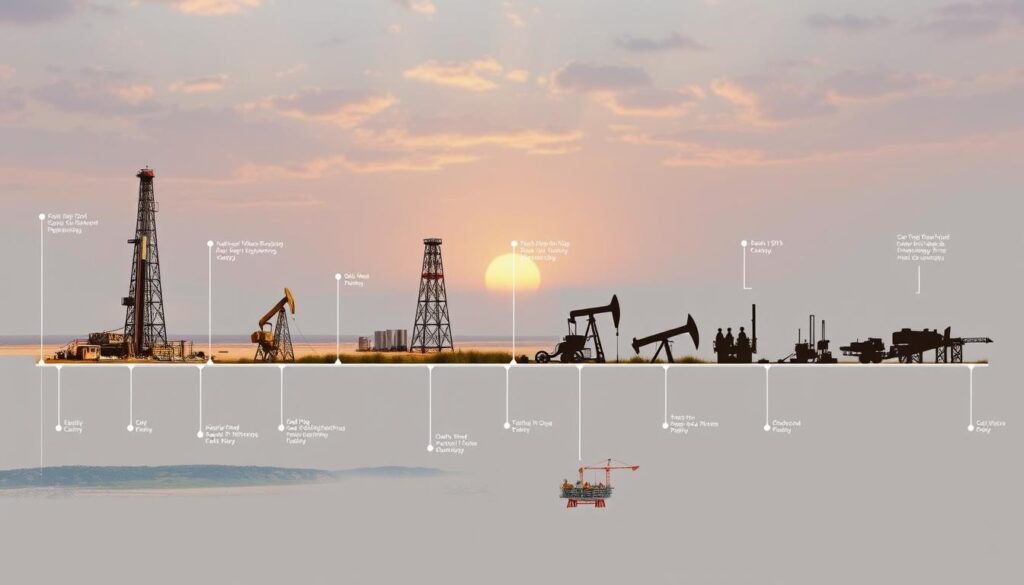Petroleum engineers have a high starting salary of $94,500. This shows how smart and skilled they are. They work with complex data to find energy solutions for the world.
Petroleum engineers are very smart. They use science and new technology to solve problems. Their work is key to solving energy issues worldwide.
Being smart is more than just knowing tech. They use data from the earth and computers to find energy. They do this in a way that is good for the planet.
Key Takeaways
- Petroleum engineers earn top salaries with exceptional technical skills
- The profession demands advanced mathematical and scientific knowledge
- Problem-solving is a core competency in petroleum engineering
- Technological innovation drives petroleum engineering success
- Geoscience understanding is critical for petroleum engineers
Understanding the Role of Petroleum Engineers
Petroleum engineering is a dynamic and challenging career in the oil and gas industry. These skilled professionals play a critical role in extracting valuable hydrocarbon resources from the earth. They combine advanced technical knowledge with strategic problem-solving abilities.
Core Responsibilities and Technical Demands
Petroleum engineers tackle complex challenges in extracting and processing energy resources. Their core responsibilities include designing drilling strategies and analyzing underground geological formations. They also develop innovative extraction techniques.
Professionals in petroleum engineering must master cutting-edge technologies. This helps them maximize resource recovery efficiently.
Problem-Solving Requirements in the Field
The oil and gas industry careers demand exceptional analytical skills. Engineers constantly evaluate technical obstacles and develop creative solutions. They also manage high-pressure situations.
They must rapidly assess geological data, equipment performance, and environmental impacts. This helps them make critical decisions.
Mathematical and Scientific Foundations
Success in petroleum engineering requires robust mathematical and scientific expertise. Engineers use advanced calculus, physics, and geoscience principles. These help them predict reservoir behaviors and optimize extraction processes.
Their technical proficiency enables precise resource management and economic feasibility assessments.
| Skill Category | Required Competencies |
|---|---|
| Technical Skills | Advanced mathematics, geology, fluid dynamics |
| Problem-Solving | Complex analytical reasoning, adaptability |
| Industry Knowledge | Drilling technologies, reservoir management |
| Software Proficiency | Simulation tools, data analysis platforms |
The multifaceted nature of petroleum engineering demands continuous learning and adaptation. Professionals must stay current with technological advancements and industry trends. This helps them excel in this challenging yet rewarding field.
The Educational Journey of Petroleum Engineers
Petroleum engineering schools have changed a lot over the years. The path to becoming a petroleum engineer is tough. Students learn a lot of technical skills and knowledge from different fields.
Today, universities for petroleum engineering ask for a lot of study. Students need to finish 128-130 credit hours. They learn about advanced math, data analysis, and new tech skills.
| Educational Focus Areas | Key Skills Developed |
|---|---|
| Reservoir Engineering | Advanced Data Analysis |
| Drilling Technologies | Machine Learning |
| Production Engineering | Geospatial Modeling |
| Sustainability Studies | Carbon Emissions Management |
Top schools like the University of Texas and Texas A&M use new ways to teach. They use virtual reality, team projects, and special courses. These include learning about CO2 emissions tracking and digital transformation.
Students must get good at programming, geostatistics, and complex simulations. Many programs also teach cybersecurity, data sciences, and engineering from different fields. This helps them face the changing energy world.
Getting ABET accreditation is key for a professional license. It shows that schools meet high standards set by the industry.
Critical Thinking and Problem-Solving Abilities
Petroleum engineers are known for their sharp minds. They tackle tough challenges with great critical thinking and problem-solving skills. Their work is very demanding and needs advanced analytical skills.
These smart people deal with complex technical issues. They often face incomplete data and unsure conditions. Their skill in making quick, precise decisions shows their top-notch professionalism.
Complex Mathematical Applications
Math skills are key for petroleum engineers. They use advanced math to study geological formations and predict how wells will perform. They also work on finding the best ways to extract oil and gas.
| Mathematical Skill | Application in Petroleum Engineering |
|---|---|
| Advanced Calculus | Reservoir Modeling |
| Statistical Analysis | Risk Assessment |
| Computational Methods | Drilling Optimization |
Decision-Making Under Pressure
Petroleum engineers often face high-pressure situations. They need to make quick, accurate decisions. Their skills let them quickly evaluate complex situations, using both technical knowledge and strategic thinking.
Technical Analysis Skills
Advanced technical analysis is a key part of petroleum engineering. These experts use the latest tools and methods to solve tough engineering problems. They show great intellectual flexibility.
These engineers are always learning and adapting. They turn complex technical problems into creative solutions. This makes them truly intelligent professionals.
Are Petroleum Engineers Intelligent People?

Petroleum engineering needs a mix of smart thinking and hands-on skills. People in this field face tough challenges that need top problem-solving skills. Their smarts go beyond just book learning, including thinking on their feet and knowing lots of technical stuff.
Working deep underground is a huge brain challenge. Petroleum engineers use knowledge from geology, math, and new tech. They make big decisions in tough spots with little info.
Numbers show how smart petroleum engineering is. There are only a few places in the U.S. that teach it, and they only graduate a few hundred each year. It’s a field that needs people who are really good at combining different kinds of knowledge.
| Intelligence Indicator | Petroleum Engineering Characteristics |
|---|---|
| Educational Complexity | Multidisciplinary knowledge integration |
| Problem-Solving Skills | High-pressure decision making |
| Technical Proficiency | Advanced modeling and simulation |
The job is very demanding, with long hours and big responsibilities. This shows that petroleum engineers are not just smart, but also very skilled. They are key players in making new energy solutions.
Advanced Technical Skills Required in Petroleum Engineering
Petroleum engineering needs top-notch technical skills. It’s more than just engineering. It requires using complex tools and knowing many subjects well.
In the fast-paced oil and gas world, petroleum engineers must be tech-savvy. They use the latest tech to turn raw data into useful info.
Computer Modeling and Simulation
Petroleum engineers use big computers to handle huge data sets. These supercomputers help predict how wells will perform and find the best places to drill.
Geoscience Knowledge Integration
Good petroleum engineers mix many sciences. They use geology, physics, math, and computer skills to solve tough problems.
Engineering Software Proficiency
Today’s petroleum engineering depends on special software. Engineers need to know how to use programs for:
- Reservoir characterization
- Seismic data interpretation
- Production optimization
- 3D geological mapping
Stats show how skilled these engineers are: 98% use emails every day, and 54% make big decisions often. This shows how demanding petroleum engineering is.
The Evolution of Modern Petroleum Engineering

Petroleum engineering has changed a lot over the years. The first degree in petroleum engineering was given in 1915 by the University of Pittsburgh. This was a big step for the field.
From 1900 to 1920, the main focus was on drilling. Engineers worked on stopping water leaks and making drilling better.
Early engineers tackled big technical problems. They came up with new ways to design wells. They found the best sizes for tubing, chokes, and packers. Their work helped create the complex jobs we have today.
The field of petroleum engineering keeps getting better. Modern challenges like drilling in deep water and finding new resources have made it more complex. Now, engineers need to know about computer modeling, geoscience, and digital tech.
Important changes in petroleum engineering show how smart the field is:
- Advanced computational techniques
- Sophisticated reservoir management strategies
- Enhanced digital simulation capabilities
Today, petroleum engineers need to be more than just skilled. They must be able to adapt, think creatively, and plan ahead. The field keeps growing, always looking for new ways to improve.
Innovation and Technology in Petroleum Engineering
The world of petroleum engineering is changing fast. New technologies are making big changes. These changes help find, extract, and manage energy resources better.
Artificial Intelligence Applications
Artificial intelligence is changing petroleum engineering. It uses machine learning to analyze data. This helps predict how underground resources will behave.
These smart systems can look at huge amounts of data. They find the best places to drill and how to get oil out.
Digital Transformation
Digital technologies are changing how petroleum engineering works. Now, we can work from far away and use machines to help us. This is great for places that are hard to reach.
There are also digital models of oil systems. These models are very detailed. They help engineers plan and test without real-world risks.
Smart Technology Integration
Smart technologies are being used in many ways. They help get more oil out of the ground. They also find leaks and make drilling easier.
These new tools make work better and safer. They also help protect the environment.
The future of petroleum engineering is all about keeping up with new tech. It needs people who are good at both tech and thinking creatively.
Career Growth and Professional Development
Petroleum engineers face a world full of career chances in the oil and gas field. This job is growing fast, with a 8% increase in jobs from 2021 to 2031. Every year, about 1,700 new jobs open up, making it a great choice for those who want to grow.
The pay for petroleum engineers is also very good. They make a median of $130,850 a year. Some make up to $208,000. In India, new engineers start at INR 8-10 lakh a year, showing the job’s value worldwide.
It’s important for petroleum engineers to keep learning. About 75% of them take part in workshops, seminars, and online classes. Going to industry events can also help, boosting job chances by up to 40% for new graduates.
| Career Development Metrics | Percentage/Data |
|---|---|
| Professionals pursuing advanced studies | 30% |
| Excel proficiency in daily work | 80% |
| Internship success rate | 50% higher full-time employment |
Being part of the Society of Petroleum Engineers (SPE) helps a lot with networking. More than 60% of members say their career moved forward because of these connections. Diversity is becoming more important, with women making up about 15% of the workforce, showing room for everyone to grow.
To move up in this field, you need to learn many skills, keep up with new tech, and always be learning. The engineer who adapts, learns, and connects will do well in this exciting and rewarding field.
Global Impact and Professional Challenges
Petroleum engineering goes beyond local areas, opening up big global chances and tough challenges. Jobs in the oil and gas field need engineers to be very flexible and good at talking across cultures.
International Project Management Dynamics
Petroleum engineers handle complex projects around the world. They need to plan well and understand different cultures. With 208 active offshore drilling units, they face big challenges.
There’s a 8% growth in jobs, leading to over 2,000 new positions every year. This shows the field is always changing and growing.
Cross-Cultural Communication Expertise
Good petroleum engineers know how to talk across different cultures. Almost 60% of oil and gas leaders say being adaptable is key to keeping great workers.
| Professional Challenge | Impact Percentage |
|---|---|
| International Travel Requirements | 65% |
| Cross-Cultural Communication | 55% |
| Project Management Complexity | 75% |
The world of petroleum engineering needs people who can mix technical skills with cultural smarts. Strategic communication is key for working well globally. It helps engineers work together, no matter where they are or what they face.
Industry Leadership and Strategic Thinking
Smart petroleum engineers are key in shaping the world’s energy future. They mix technical know-how with strategic thinking to drive new ideas. Leading in this field means understanding complex market trends well.
When they move up to lead, strategic thinking is essential. They face tough challenges like tech changes, green issues, and global energy needs. Being able to link tech skills with business smarts makes them stand out.
Strategic Leadership Capabilities
Top petroleum engineers take a big-picture view of industry problems. They use data to make big decisions on energy, green issues, and costs. They get how tech, market trends, and green rules work together.
| Strategic Skill | Impact on Petroleum Engineering |
|---|---|
| Market Analysis | 65% of strategic decisions based on thorough trend study |
| Risk Management | Keeps company safe and respected |
| Technological Integration | Pushes for new energy solutions |
The best petroleum engineers have emotional intelligence and leadership skills. They’re great at talking, motivating teams, and adjusting to fast changes. Their strategic thinking helps them see market changes and find solutions that mix new tech with cost-effectiveness.
Conclusion
Petroleum engineering is a field that needs top-notch brains. Are petroleum engineers smart? Yes, they are. They’ve been showing off their smarts and tech skills for over a century.
This job is all about deep technical knowledge. They learn a lot of math, physics, chemistry, and geology. They use this knowledge to solve big problems in the energy world.
The need for energy keeps growing, making petroleum engineers very important. They work on new tech, like digital tools and AI. They also help find ways to use energy in a green way.
As energy needs change, petroleum engineers keep proving how smart they are. They show that being smart is not just knowing stuff. It’s also about using that knowledge in creative ways.



